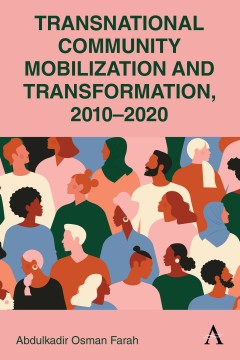Transnational Community Mobilization and Transformation, 2010-2020
By Abdulkadir Osman Farah
Other Formats Available:
E-Book- About This Book
- Reviews
- Author Information
- Series
- Table of Contents
- Links
- Podcasts
About This Book
This book contends that the struggle and perseverance of transnational communities occur within and through at least three interrelated dynamic socio-political processes. The first is the pattern in which transnational communities mobilize to access public opportunities. This occurs when communities deal with cross-border and cross-national trajectories. The second relates to transnational community civic mobilization in relation to the prevailing, as well as emerging, socio-political conditions and situations within host and homeland societies, including community encounters and connections with like-minded civic communities. The third concerns immediate local community mobilizations in response, as well as an extension, to existing and emerging local socio-political encounters and connections. Therefore, this work proposes that transnational local, national, and transnational mobilization takes place within the dynamic horizontal processes of mobilizing communities in simultaneously expanding community horizons while preserving community well-being in multiple interrelated contexts.
More significantly, current studies drawing on transnational political sociological frames, as well as public sociopolitical scholarly debates, often consider the relationship between the state and society as inherently hierarchical and oppositional. Such relational and hierarchical conceptions of state–society interactions insist on the idea that formal state structures dominate and often subordinate informal community-oriented socio-political platforms. These top-down institutional priorities and actions limit the horizontal dynamics of transnational communities, including community attempts to balance local, national, and transnational encounters and connections, while avoiding state–society as well as local, national, and transnational extremes. Modern scholarship, thereby, departs from an overemphasis on class distinctions of society, as well as potential class-based interest group mobilizations, as the basis for diverse struggles and perseverance within the dynamics of state–society relations.
Reviews
“The etymology of the term ‘theory’ is from the Greek root thea, to see. And the author of this book does indeed make the reader see, both in the sense of interpreting the here-and-now while at the same time engaging the mind’s eye to imagine future configurations of events yet to come. Distin-guished by its erudition, clarity, and accessibility, this book is not only essential reading for anyone interested in transnational studies but is also an important contribution to diverse disciplines, including anthropology, economics, development, and African studies.” — Ali Jimale Ahmed, Professor at Queens College and the CUNY Graduate Center, New York
“Studying Somali Danish communities in the city of Aarhus, Dr. Farah produces reflective research of citizens from a collapsed state into a privileged Danish society. Accounting the limits of welfare society in terms of inclusion and recognition despite the welfare resources, the author analyzes Somali Danes as harbingers of cosmopolites with multiple influences and experiences creating a globalized community.” — Anders Michelsen, Copenhagen University
“Diving into the intricate world of transnational citizenship and civic mobilization, Osman’s book provides a comprehensive exploration of a dynamic phenomenon: the transnationalization of inter-state relations and local-transnational connections. Drawing from his personal and professional ex-periences in Denmark and employing meticulous research and insightful analysis, the author illuminates the pathways to cross-border activism and social mobility and highlights the transformative power of transnational collective action. A compelling read for scholars, activists, and global citizens alike, this book is a timely reminder of our interconnectedness and the potential for positive change on a transnational scale.” — Li Xing, Yunshan Leading Scholar and Professor, Guangdong University of Foreign Studies, China; Professor, Department of Politics and Society, Aalborg University, Denmark
Author Information
Dr. Abdulkadir Osman Farah teaches at Copenhagen University and is associate of Urban Sanctuary, Migrant Solidarity and Hospitality in Global Perspective with Aalborg and Ryerson Universities. Dr. Farah is also currently associate researcher of Tswane University of Technology, Pretoria, South Africa .
Series
Table of Contents
Foreword by John Clammer; Foreword by Professor Martin Bak Jørgensen; Afterword by Ananta Kumar Giri; When Lions Roar Calves Whisper: A Case of Transnational Community Mobilization (2010–20); 1. Praining Nation-States with the Becoming of Transnationally Connected; 2. Conceptualizing Local Transnational Encounters and Connections (LOTEC) ; 3. Coping with Transnational Citizenship Challenges; 4. The Quest for Transnational Civic Mobilization; 5. The Search for Employment and Social Mobility; 6. Struggling for the Improvement of Community Image; 7. Transnational Communities Contributing to Local Public Policy Formations to the 2020 Global Pandemic; 8. Mobilizing Against Forced Repatriations; 9. Transnational Communities Supporting Refugees Overcoming “Limbo” Status; Index
Links
Stay Updated
Information
Latest Tweets



